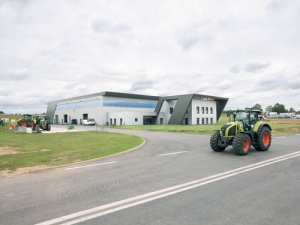Until the early 1990’s Claas was known as a manufacturer of harvesting machinery for the grain and livestock industries, but that changed in 1993.
The introduction of the Xerion systems tractor moved Claas into a whole new sector, with a machine that incorporated the concepts of a modern tractor and a specialised systems vehicle. It spawned a new generation of units that could be pushed, pulled or carried and make the most of the Xerion’s shiftable cabin, load platform and ZF sourced HM8 continuously variable position.
More importantly, it signalled Claas’ intention to become a long-line supplier, and break into the conventional tractor market. This came about in 2003 when Claas bought a majority shareholding in Renault Agriculture and, in particular, the Le Mans tractor plant
Claas is well known for its above average spending on R&D, as shown in the recent commissioning of a new testing and validation facility near Trange, France.
Based on two state-of-the-art test benches, the facility allows designers and engineers to simulate the entire working life of a machine in a few short weeks. Housed in a purpose-built 12m structure, the massive test benches are mounted on earthquake-proof floor pads constructed from 950 tonnes of concrete and 60 tonnes of steel.
The benches are large enough to take the company’s entire range of tractors, combines and forage harvesters. As well as ‘whole’ machine tests they can be used for individual component tests with a high level of precision and, more importantly, repeatability.
Working 24/7, data can be generated in a few hours which would have typically taken many months, significantly reducing product development lead times. New designs can be given preliminary tests early in their life, refinements can be made and re-tests carried out. From the test benches machines will typically move to test tracks before completing extensive in-field testing of up to 40,000 hours.
Used in tandem, the driveline test bench assesses and allows optimisation of the engine, transmission, hydraulic system and all-important management software. By generating hundreds of combinations of torque, speed and temperature the system can replicate different agricultural practices used throughout the world.
In turn, the massive amount of energy generated by the driveline test-bench is used to power a four-post, test bench which allows researchers to assess durability, reliability and comfort in order to optimise chassis and suspension settings. It consists of four vibrating hydraulic rams, each with a lift capacity of 25 tons, a maximum frequency of 25Hz and a maximum height difference of 40cm.
Group product manager for CLAAS Tractors, Dave Knowles, says “This technology means customers can be assured they are investing in high performance machines that not only increase their productivity, efficiency and comfort, but are even more reliable.”
www.claasharvestcentre.co.nz

















